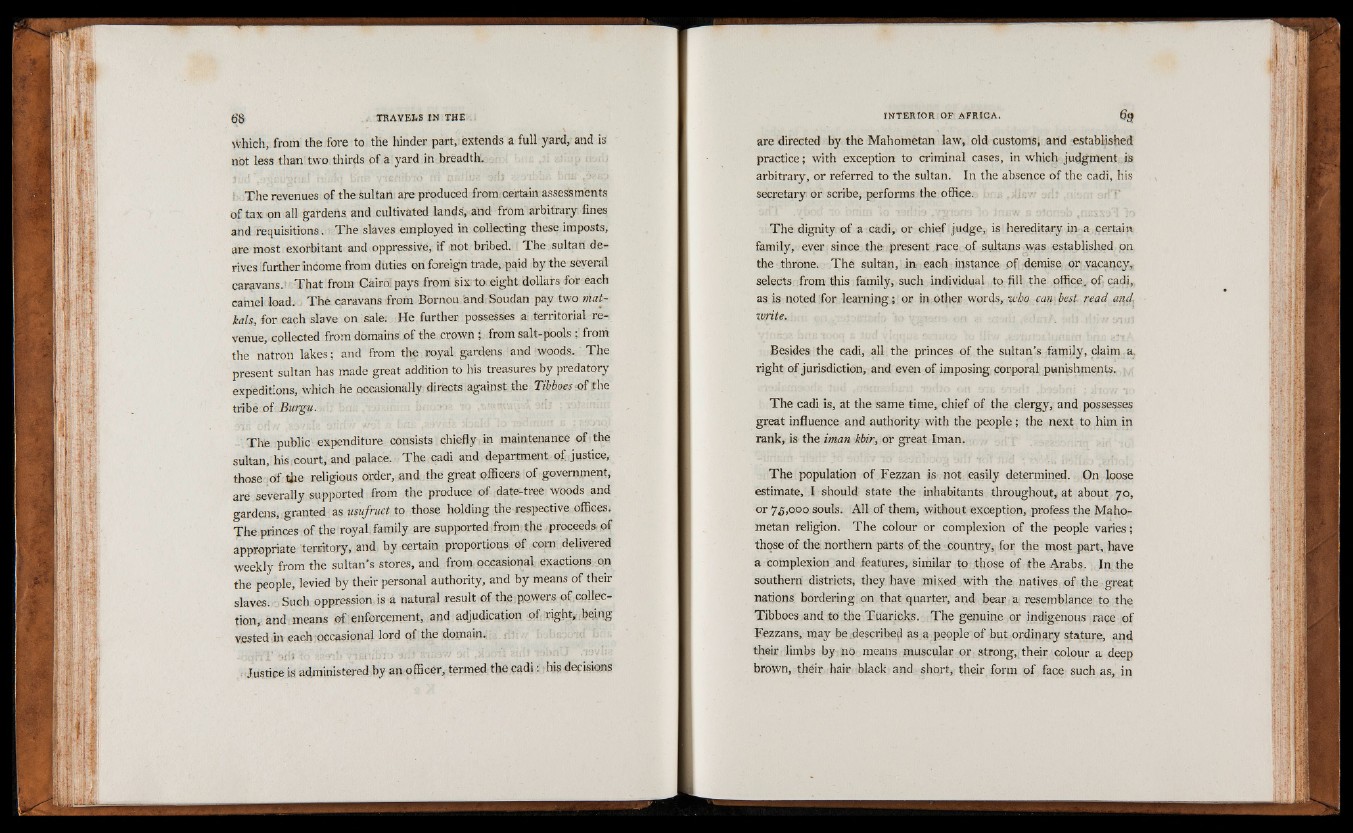
■Which, from the fore to the hinder part, extends a full yard, and is
not less than two thirds of a yard in breadth.
i The revenues of the sultan are produced from: certain assessments
of tax on all gardens and cultivated lands!, and from arbitrary fines
and requisitions. The slaves employed in collecting these imposts,
are most exorbitant and oppressive, if not bribed. The sultan derives
further income from duties on foreign trade, paid by the several
caravans. That from Cairo; pays from six: to. eight dollars for each
camel load, i The caravans from Bornou and:Soudan pay two rtiat-
kals, for each slave on sale. He further possesses a territorial revenue,
collected from domains of the crown ;. from salt-pools; from
the natron lakes; and from the royal gardens and woods. The
present sultan has made great addition to his treasures by predatory
expeditions, which he occasionally directs against the Tibboesoi the
tribe of Burgu.
The public expenditure consists chiefly in maintenance of the
sultan, his court, and palace. The cadi and department of justice,
those of the religious order, and the great officers of government,
are severally supported from the produce of date-tree woods and
gardens, granted as usufruct to those holding the respective offices.
The princes of the royal, family are supported from the proceeds of
appropriate territory, and by certain proportions of corn delivered
weekly from the sultan’s Stores, and from occasional exactions on
the people, levied by their personal authority, and by means of their
slaves. Such oppression is a natural result of the.powers of collection,
and means of enforcement, and adjudication of right, .being
vested-in each'occasional lord of the domain.
Justice is administered by an officer, termed the cadi: his decisions
are directed by the Mahometan law, old customs; and established
practice; with exception to criminal cases, in which judgment is
arbitrary, or referred to the sultan. In the absence of the cadi, his
secretary or scribe, performs the office.
The dignity of a cadi, or chief judge, is hereditary in a certain
family, ever since thé present race of sultans yyas established pn
the throne. The sultan, j in each instance of demise or vacancy,
selects from this family, such individual to fill the office, of cadi,
as is noted for learning ; or in other words, who can best read and,
write.
Besides the cadi, all the princes of the sultanas family, claim a.
right of jurisdiction, and even of imposing corporal punishments. .,
The cadi is, at the same time, chief of the clergy, and possesses
great influence and authority with the people ; the next to him in
rank, is the iman kbir, or great Iman.
The population of Fezzan is not easily determined. On loose
estimate, I should state the inhabitants throughout, at about 70,
or 75,000 souls. All of them, without exception, profess the Mahometan
religion. The colour or complexion of the people varies;
those of the northern parts of, the country, for the most part, have
a complexion and features, similar to those of the Arabs. In the
southern districts, they have mixed with the natives of the great
nations bordering, on that quarter, and bear a resemblance to the
Tibboes and to the Tuaricks. The genuine or indigenous race of
Fezzans, may be described as a people of but ordinary stature, and
their limbs by no means muscular or strong, their colour a deep
brown, their hair hlack and short, their form of face such as, in